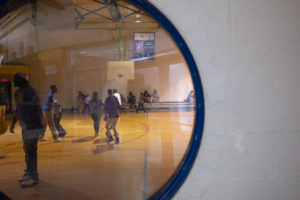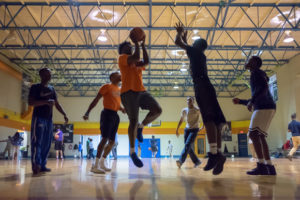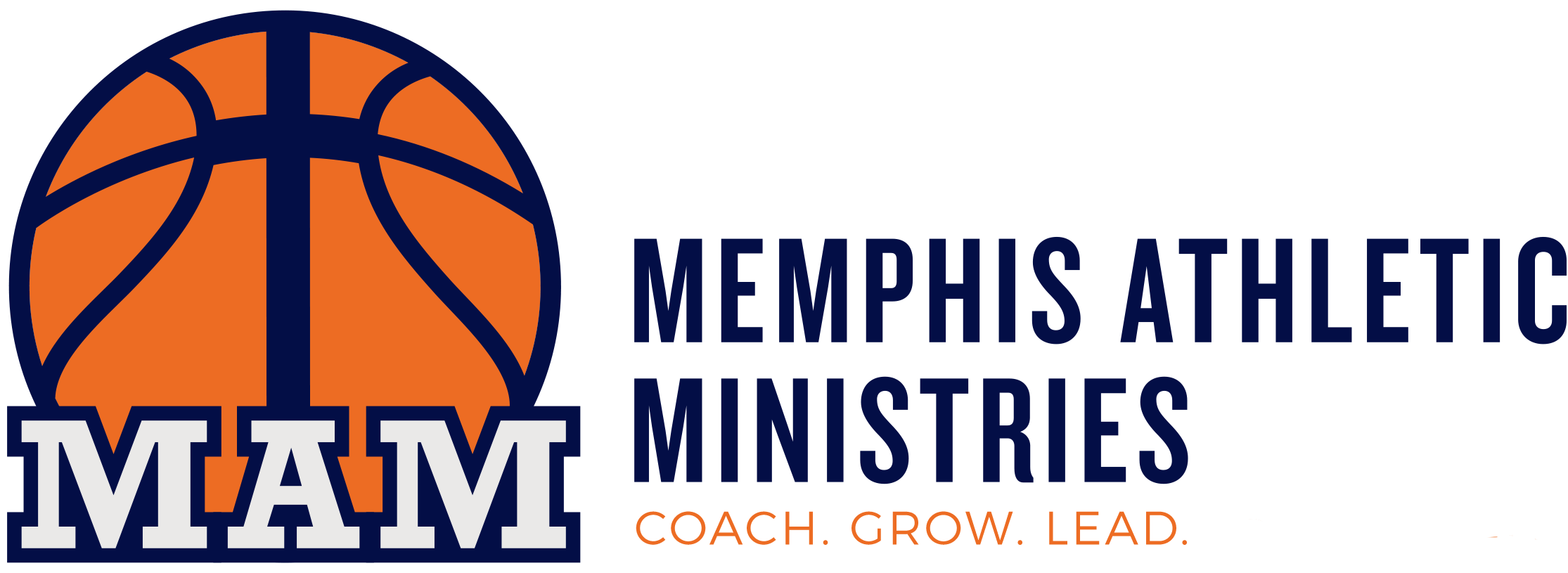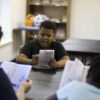High Ground News, May 17, 2018, by Cole Bradley

Students and volunteers interact on the basketball court during MAM’s end of the year celebration inside MAM Greenlaw.
Facing serious concerns like drugs, gangs, and crime, communities often call for more youth programming to keep kids safe and productive. In Uptown, a handful of organizations are already working to build thriving kids and a thriving community, but they can’t do it alone.
There’s a concern in Uptown. It’s a concern familiar to many neighborhoods with a history of disinvestment. It was voiced in the Community Redevelopment Agency’s recent Uptown community listening sessions. Neighbors also echoed the sentiment to the High Ground News team in an April editorial advisory.
Uptown’s youth need healthy alternatives to unsavory street activities.
“This is important because we’ve got so many gangs and things kids can get into these days. They need things like this to keep them away from that. If they didn’t have places like MAM [Memphis Athletic Ministries] to come in, they’d be out in the streets,” said Ernie Prude, area director for Memphis Athletic Ministries.
While there is always a need for more constructive activities for youth, Uptown already has a host of organizations and individuals wrapping around its kids to see them successfully to adulthood. They’re doing it not just with strong programming but deep, interpersonal relationships that turn neighbors into family. And the real opportunity, they say, is raising awareness and community support for the efforts already underway.
STRONG PROGRAMS FOR POWERFUL SUPPORT
Girls Inc. is the oldest youth organization in the area, dating back to 1946. Its Lucille Devore Tucker Center is located at 686 North Seventh Street and is described by president and CEO Lisa Moore as its “number one anchor.”
The center serves girls six to eighteen-years-old with after-school and weekend programs and camps during school breaks. It is open to all girls across the region, but Uptown’s 38107 ZIP code is one of its primary service areas and Moore agrees that programs are especially important in the Uptown community.
BRIDGES is another organization located in Uptown that serves youth from across the region. Their Jim Boyd BRIDGES Center opened at 477 North Fifth Street in 2004 and offers workshops, camps, a yearly end-of-summer festival, and an indoor climbing wall open to the public two to three nights a week.
Memphis Athletic Ministries is comparatively new but is having a major impact. Since 2010, their Greenlaw center at 190 Mills Avenue has served up to 120 kids a day. From 2:30 p.m. until 7 p.m., students participate in sports, literacy programs, life skills classes, field trips, and bible study.
Oasis of Hope formed out of Cordova’s Hope Presbyterian Church in 2001. They began by volunteering with other organizations then purchased a few small buildings for office and community space. They eventually started their own after school and literacy programs, a girl’s choir, and sports and bike repair programs.
Year after year there’s something new that, from our faith-based perspective, God provides the opportunity and resources to make happen,” said executive director Terry Hoff. Today, Oasis serves around 90 kids daily at their youth center located in the back of the Bickford Community Center at 233 Henry Avenue.
DEEP RELATIONSHIPS FOR DEEP CHANGE
While organizations and their programs are critically important, their staffs say it’s the efforts they make towards individual relationships that have the biggest impacts.
For example, each MAM staffer has a group of kids they directly mentor.
April Golden’s current group of girls are planning a mani-pedi night at her house, complete with takeout and movies. And after eight years, she now has kids home from college for the summer who will visit for all the typical things — food, love, laundry.
“I’ve developed some really deep relationship with a lot of kids over the years. So much so that I’m like a momma to a lot of them,” said Golden, assistant neighborhood director and a founder of the Greenlaw center.

A group of MAM students plays half court basketball inside the gymnasium of the Greenlaw Community Center.
Prude echoed her sentiment. “It’s like another part of your family. It’s more stressful because it’s more kids outside of the other kids you already have in your house,” he said. “You have to go to school stuff, when something goes wrong at home, they call you. Every day, every hour of the day. But it’s good that they trust you that much, they know that you’re going to come alongside them whatever it is.”
While MAM and Oasis work through a blend of formal programming and informal relationships, Grace Church is almost entirely relationship-based.
“The most encouraging work going on is not a program,” said Nathan Sawyer, one of a council of pastors and elders who govern Grace.
Grace began 11 years ago with a few families feeling called to move to the neighborhood and begin a service-based ministry. Today they have around 100 congregants and hold services in MAM’s Greenlaw center gym. While they do now have some formal youth programs, it’s not their focus.
THE BIGGEST NEED FOR A BIGGER IMPACT
These organizations and others like them have definitely seen positive change in the neighborhood.
“I’ve seen a huge change in the kids and in the community. It used to be really heavily infested with gangs,” said April Golden. “There were a lot of fights and shootings. But over the last three years especially, I’ve seen a drastic turnaround. I think it’s just because of the culture we’ve developed here … They know what we’re about. When [gang members] do come, they come and fall in just like all the rest of the kids. They play ball and hang out.”
That said, there is a major barrier to expanding their efforts and impact. Despite years in the neighborhood, there are still youth who are unaware of these organizations and their offerings, and there are still community members who don’t know the need for volunteers or how to get involved.
It’s simple investments — teaching a job skills class, helping with administrative work, reading with students, shooting a game of hoops, or simply being a listening ear — that add up to big change.
“We need more people in the community to understand that we can’t do this alone,” said April Golden. “A lot of these kids just want that attention and love, but we can’t be that for everyone.”
In all cases, it will take a group effort of community members and organizations to ensure that every child has the opportunity to learn and play in a safe and nurturing space, surrounded by people who are fiercely committed to their success.
As Ernie Prude said and others echoed, “We have them for a few hours of the day. They have to go back out to the community. So if we can get the community on our side, to do the same things we’re doing inside out there … it takes a village. That’s real.”



